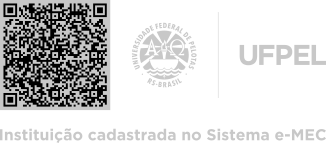Mathematical Modeling
Phone number: 5332757343 – Secretaria do IFM
e-mail: ifm@ufpel.edu.br
Website: https://wp.ufpel.edu.br/ppgmmat/
Address:
Presentation
The graduate program in Mathematical Modeling (PPGMMat for its spelling in Portuguese) started its activities in 2013. It aims to train highly qualified professionals to develop teaching, research and extension activities to meet significant demand in the formation of human resources in Brazil and other Mercosur countries.
PPGMMat currently has three possible concentrations (Transport Phenomena, Optimization and Control, Numerical Modeling of Atmospheric Processes) and four lines of research (Modeling of Dispersion of Pollutants, Modeling of Neutral Particle Transport, Optimization and Control, Numerical Modeling of Atmospheric Processes).
The admissions process takes place every year. Students earn a degree upon completing 24 credits in courses, 3 of which are mandatory.
For more information, please visit our website: http://pgmat.ufpel.edu.br
Target Audience
Students with degrees in Mathematics, Physics, Engineering, Meteorology or related fields.
Area of Concentration
Mathematical Modeling
Lines of Research
Research Lines:
1) Transport Phenomena:
The Transport Phenomena research line focuses on the treatment of transport and diffusion problems, with emphasis on the approach to direct and inverse problems, multidimensional, linear and nonlinear, stationary and time-dependent problems. This line includes the consolidation and construction of computational simulation tools based on hybrid numerical-analytical methodologies for problems applied to the exact and earth sciences and engineering. Examples include: In the topic of transport phenomena, methodologies are developed for the treatment of problems associated with the particle transport equation in different applications such as reactor physics and radiative transfer. In diffusive problems, the most important are the simulation problems of pollutant dispersion in the atmospheric boundary layer as well as in rivers and canals, and porous media, using approaches with analytical representation. In heat and mass transfer, problems related to the heating of building facades, as well as the thermal comfort of environments, are of interest. Numerical modeling of atmospheric processes includes problems of weather forecasting and environmental monitoring. Such studies are related to the development of physical models, construction of the initial condition (data assimilation and initialization), investigation of mathematical properties of these models, statistical and dynamic treatment of observation data through conventional techniques and artificial intelligence, such as neural networks. In chemical kinetics, an asymptotic analysis is used to verify reduced mechanisms of chemical reactions for the combustion of biofuels.
2) Applied Mathematics Methods:
The Applied Mathematics Methods research line has two fundamental objectives: (i) to rigorously formulate mathematical models of phenomena that occur in various areas of science, in nature and in the development of new technologies, and (ii) to develop and apply methodologies that integrate analytical and computational techniques to solve problems inherent to such models. To this end, methods from various areas of mathematics are used in order to cover the largest possible number of physical and natural phenomena. Of particular interest are the methods of mathematical, functional and convex analysis, differential equations and dynamic systems, variational and numerical calculus, mathematical homogenization, optimization and control. Examples of phenomena studied and areas of application are the following: bone biomechanics, physical properties of advanced materials and composites, nanosciences, structural integrity and optimization, process optimization, mechanical vibrations, monitoring and control of structures, sensors and actuators, control of population systems, epidemiology, thermal and electrical conduction, electrostatics, fluid flow in porous media, fluid-structure interaction, propagation of mechanical and electromagnetic waves, radioactivity, communications and traffic, shielding, radiation and thermal shocks, irrigation and soil infiltration, prospecting and exploration of minerals and oil.
Study Plan
The PPG in Mathematical Modeling offers semester-long courses, as listed below.
Subject Name:
Applied Partial Differential Equations – MANDATORY
Advanced Topics in Calculus – MANDATORY
Numerical Methods for Differential Equations – MANDATORY
Numerical Methods in Linear Algebra
Mathematical Methods in Transport Phenomena
Fluid Mechanics
Solid Mechanics
Optimization Methods I
Optimization Methods II
Control Systems
Special Topics in Transport Phenomena
Modeling the Dispersion of Air Pollutants
Deterministic Methods in Neutral Particle Transport
Vibrating Systems
Special Topics in Optimization, Control and Nonlinear Analysis
Seminars in Transport Phenomena
Topics in Mathematical Modeling
Seminars in Optimization and Control
Variational Calculus and Applications
Finite Element Method
Atmospheric Models
Introduction to Mathematical Homogenization
Faculty
Alexandre Molter – alexandre.molter@ufpel.edu.br
Claudio Zen Petersen – claudiopetersen@yahoo.com.br
Daniela Buske – daniela.buske@ufpel.edu.br
Douglas da Silva Lindemann – douglas.lindemann@ufpel.edu.br
Fabrício Pereira Härter – fabricio.harter@ufpel.edu.br
Glênio Aguiar Gonçalves – glenio_a@yahoo.com
Guilherme Janecke Weymar – guilhermejahnecke@gmail.com
Jairo Valões de Alencar Ramalho – jairo.ramalho@ufpel.edu.br
Leonardo Calvetti – lcalvetti@ufpel.edu.br
Leslie Darien Pérez Fernández – leslie.fernandez@ufpel.edu.br
Marcelo Felix Alonso – mfapel@gmail.com
Régis Sperotto de Quadros – regis.quadros@ufpel.edu.br
Ruth da Silva Brum – ruthdasilvabrum@gmail.com
Number of credits required
The student must complete at least 24 credits in subjects from the Program
